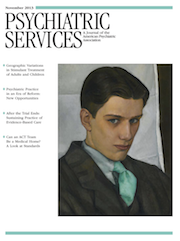War Is Not the Answer
To the Editor: After reading the three articles in the July issue on suicide among U.S. veterans and active-duty service members (1–3), with their emphasis on suicide risks, rising rates of suicide, and the need for an increase in outpatient mental health staff to lower suicide rates, all I could think of was this: People go into the military and are trained to kill, and then they go into action where they see and perhaps engage in unimaginable horrors—and even get honored for it. Then we are surprised and concerned about their high suicide rates!
I know, it is not simple; there are Hitlers in the world. But even World War II grew out of the horrors of World War I. Still, I wish that the emphasis in Psychiatric Services articles—and indeed the whole world—would be on preventing wars rather than on dealing with the understandable suicidal aftermath.
Yes, this is naïve and simplistic thinking on my part. But if social scientists, politicians, and all of us don’t put our research efforts and thinking into how to prevent wars, there are apt to be a lot more suicides in our future.
I sincerely believe the sign that we have put up in our front yard: “War is not the answer.”
1 : Changes in suicide rates and in mental health staffing in the Veterans Health Administration, 2005–2009. Psychiatric Services 64:620–625, 2013Link, Google Scholar
2 : Suicide risk among US service members after psychiatric hospitalization, 2001–2011. Psychiatric Services 64:626–629, 2013Link, Google Scholar
3 : Suicide within two weeks of discharge from psychiatric inpatient care: a case-control study. Psychiatric Services 64:653–659, 2013Link, Google Scholar



